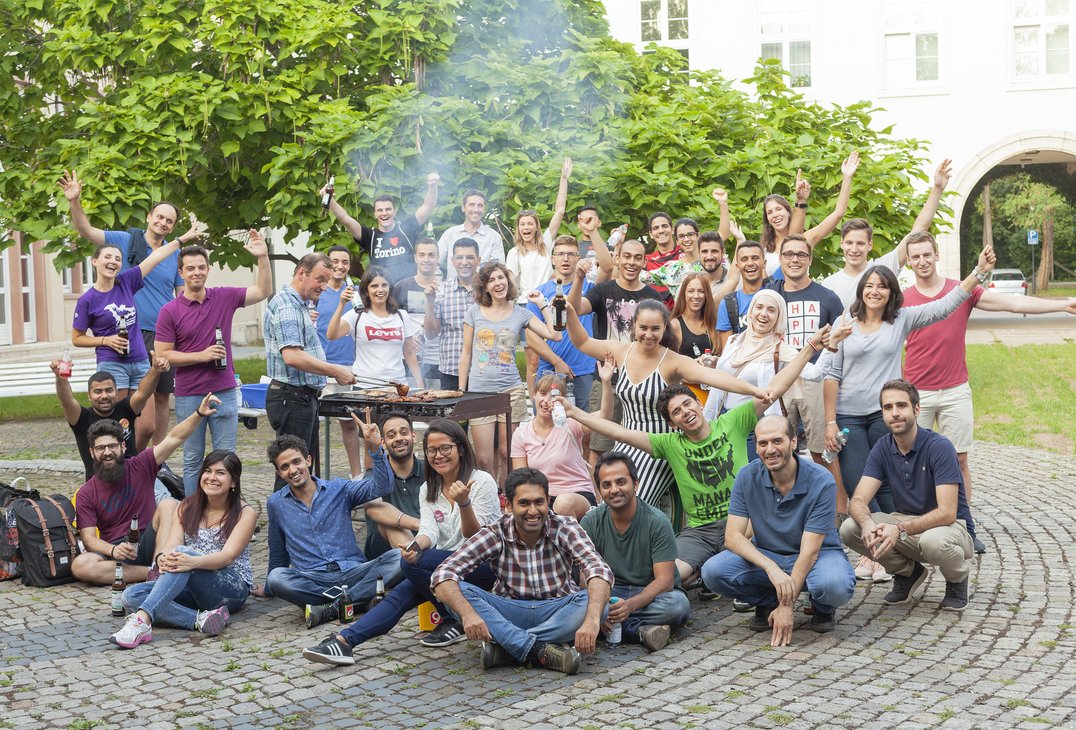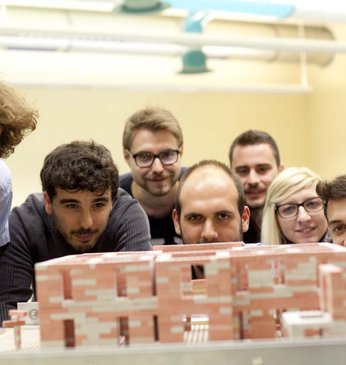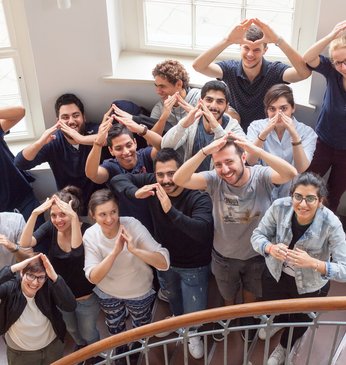Young scientists, bachelor and master students and doctoral candidates in the various fields of civil and structural engineering or any other equivalent courses of study.
Prerequisite for participation, in addition to adequate English skills, are the submission of a meaningful motivation letter and an abstract (not compulsory, but highly appreciated) with respect to current personal scientific activity which mediates the interest or the ability to enhance the project theme.
NextGen Engineers – Advanced Training Courses for a Sustainable Tomorrow
NextGen Engineers – Advanced Training Courses for a Sustainable Tomorrow
The course content at a glance
In our two-week intensive course, you will embark on a journey to master complex engineering challenges, utilizing modern tools and establishing their scientific relevance within existing interdisciplinary projects with a focus on sustainability, utilizing modern tools and aligning your projects with the Sustainable Development Goals (SDGs). This course offers a deep dive into specialized civil engineering topics, ensuring you develop solutions that are not only innovative but also sustainable.
Investigating current developments towards visualization, modelling, reaction estimation, analysis, simulation methods for sustainable development goals
This year, our course will immerse you in cutting-edge topics within civil engineering, you will explore latest advancements in the use of polymer-modified concretes, as well as simulation, advanced modeling and optimization design for reliability and efficiency in civil engineering structures, assessing their robustness in relation to increased abstraction and reduced dimensionality. Additionally, you will explore insights into the challenges and solutions related to wind forces on buildings and structures, an essential consideration for sustainable and resilient design. You will tackle the complexities of historical and existing masonry structures, applying advanced modeling techniques to assess and enhance their durability and safety under various load conditions, including seismic events. You will be trained in the use of state-of-the-art design, analysis, and simulation methods emphasizes the integration of sustainable practices in preserving and retrofitting existing structures, aligning with the goals of sustainable development by minimizing resource use and extending the utility of built assets.
This year, our course takes a significant stride forward by integrating the Sustainable Development Goals (SDGs) into our curriculum. Understanding the crucial role engineers play in building sustainable futures, we weave the principles of sustainability across our course modules. Through this integration, you will learn not only to approach engineering challenges with advanced technical skills but also with a keen eye for their environmental impact, social equity, and economic viability.
International expertise & on-site visits
Our course provides you with insights into current research projects and international development trends, going beyond technical skills, fostering a multidisciplinary approach, and encouraging you to think critically about the role of engineering in solving global challenges. You'll have the opportunity to learn from international experts, participate in on-site visits with excursions to building sites and/or leading companies, and engage in group projects that simulate real-world engineering tasks.
The current state of the art in the above-mentioned topics will be presented in the lectures and supplemented by individual guest lectures of international experts. Special topics on the individual subject areas will be developed together with the participants within the framework of the group project. Moreover, complex and technically challenging engineering questions will be answered through interdisciplinary cooperation among the participating members.
Do you have desire to...
- connect with like-minded individuals and make friendships,
- learn something new,
- immerse yourself in international atmosphere and German culture/tradition
- make a difference?
... then apply NOW and take the first step towards becoming a leader in sustainable engineering.
Jun.-Prof. Dr.-Ing. Lars Abrahamczyk (Chair of Advanced Structures)
- since 2010 coordinator and project manager of the specialised course from the Faculty of Civil Engineering at the Bauhaus Summer School
Lecturers, Involved Departments and Partners:
- Prof. Tom Lahmer (Chair of Optimization and Stochastics)
- M.Sc. Melad Haweyou (Research Asisstant at Chair of Advanced Structures)
- Dr.-Ing. Alexander Flohr (Chair of Construction Chemistry and Polymer Materials
-
Jun.-Prof. Luise Göbel (Chair of Mechanics of Engineering)
-
Jun.-Prof. Anastasia Athanasiou (Chair of Natural Hazards and Structural Resilience)
-
Prof. Guido Morgenthal (Chair of Modelling and Simulation of Structures)
-
Dr.-Ing. Ehsan Harirchian (Chair of Optimization and Stochastics)
-
M.Sc. Aanis Uzair (Research Asisstant at Chair of Advanced Structures)
The course fee is 950 EURO.
750 EURO for students & alumni
390 EURO for BUW students
The course fee includes:
- Orientation & Support
- Programme according to description
- Teaching materials
- Bauhaus Summer School ID card
- Daily Lunch at the University Cafeteria (Monday - Friday)
- Certificate
- Internet access at the Bauhaus-Universität Weimar
- Free use of library
- Accompanying programme including excursions
- Free entrance to museums belonging to Klassik Stiftung Weimar
Please note our terms and conditions (admission conditions, cancellation conditions etc.)
The course fee does not include:
- Travel expenses
- Accommodation
- Insurance
- Additional module(s) (190 €)
"Blended Intensive Programmes" is a new funding line of the ERASMUS program generation (2021-2027). Through this, the use of innovative learning and teaching methods and the possibilities of online cooperation shall be promoted.
If your university is a partner university of the Bauhaus-Universität Weimar in the Erasmus network, the travel and accommodation costs ("lump sum") of the participants for this Summer School course can be covered by the International Office of the home university after the admission. The course costs, except for the accompanying programme and board (75 €), are financed by the Bauhaus-Universität Weimar.
Please contact us for more information.
If your home university supports your participation in the course, you should submit this form together with your application.
After successful completion of the language course, you will receive a certificate of participation issued by the Bauhaus Summer School. I
Participants earn 3 credit points (ECTS) after completion of the two-week course. In order to receive credit points, t is necessary to attend at least 80% of the course lessons and to fulfil the required tasks.
Prior to your participation, it is essential that you clarify whether your home university will recognise the foreign credits you intend to earn.
If you would like to receive a grade, you must discuss this with the teacher at the beginning of the course! The fulfilment of additional tasks may be necessary.
Projects 2025
Descriptions of the projects of "NextGen Engineers – Advanced Training Courses for a Sustainable Tomorrow" can be found here.
Project 1: Use of Polymer-Modified Concretes (PCC) for Innovative Refurbishment Solutions | Dr.-Ing. Alexander Flohr (Chair of Construction Chemistry and Polymer Materials) & Jun.-Prof. Luise Göbel (Chair of Mechanics of Engineering)
Project 2: Performance-Based Façade Design: Safety, Serviceability, Sustainability. | Angela Mejorin, Ph.D., Mejorin A. Consulting
Project 3: Seismic resilience in structural design: advanced methods and applications | Jun.-Prof. Lars Abrahamczyk (Chair of Advanced Structures) & Dr. Carlos Emiliano González Calva (UNAM, Mexico)
Project 4: Computational and Experimental Wind Engineering for Long-span Bridges | Dr. Samir Chawdhury & Prof. Dr. Guido Morgenthal (Chair of Modelling and Simulation of Structures)
Project 5: Innovation Challenge: Transformation through Sustainable Innovations | Jun.-Prof. Dr. Nikolaus Seitz (Chair of Entrepreneurship and Technology Transfer)
Course Insight


